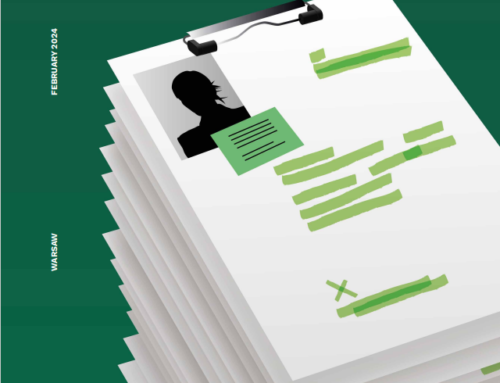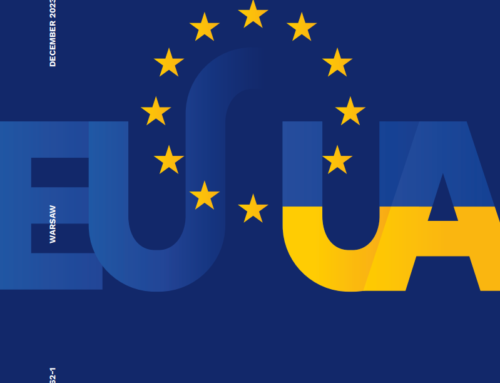Open letter from European think-tanks: Europe needs to do whatever it takes to save Ukraine
Opublikowano: 11/03/2022
Vladimir Putin’s attack on Ukraine needs to be stopped. It is a threat to the global order and to Western civilization, which Ukraine wants to belong to. We are therefore calling for further sanctions on Russia to restrain Moscow without resorting to military means.
There is mounting evidence that the Russian military is committing war crimes with deadly attacks on dense areas with many civilians and the use of cluster bombs and so-called vacuum bombs. The US Embassy in Kyiv has also said that Russia committed a war crime by shelling Europe’s largest nuclear plant and taking Vladimir Putin’s reign of terror one step further.
And although NATO is not involved in the conflict, the war with Ukraine might not be the last that Putin starts.
The relationship between the West and Russia has been deteriorating for years. In 2007, when Putin gave a speech during the Munich Security Conference, his message was clear. It can be summarized as follows: “Our attempt to be nice has come to an end; now we’re going to fight our own corner.” Indeed, this was what Putin kept doing in the following years.
In light of this, it is unsurprising that Vladimir Putin is not interested in a better relationship with the West. Although he is not indifferent to the sanctions, he is clearly not interested in following the handbook of peaceful trust-based world politics. A few days ago, Putin said that the current Western sanctions are “equivalent to declaring war”.
Is there any hope of a reset between Russia and the West? Yes, but only if we do “whatever it takes” – as Mario Draghi put it during the eurozone debt crisis. Paradoxically, we are at a similar, but more ominous, moment in history. Then and now, European countries needed help.
Unfortunately, Russian and Belarusian aggression against Ukraine has been escalating so far. The current sanctions work, but Putin’s regime is not doing anything to end the war. Hence, the EU should consider stronger measures that would hit the Russian and Belarusian economy, and increase the EU and the West’s resilience.
The EU needs to ban transactions in euros and freeze the foreign assets of the main Russian banks not subject to them so far. Extending EU sanctions to other institutions is crucial to destroying Russia’s financial system.
The EU has to ban SWIFT transactions to all Russian banks (private and state-owned). The current regulations on SWIFT only apply to selected banks that hold only about a quarter of Russian assets. Banks not subject to the sanctions can still handle foreign payments via SWIFT. However, every Russian bank must be excluded from the system to wipe out the Russian banking sector.
The EU has to stop relying on Russian gas, oil and coal. We need to block the import of energy resources, which account for 57% of Russian exports. By continuing to buy Russian coal, oil and gas, Europeans are indirectly financing Putin’s war in Ukraine. Unfortunately, high commodity prices during wartime mean that Putin’s regime is guaranteed some additional revenue.
Economic sanctions will indeed be painful for us Europeans, but this is the price of freedom. And if we are not ready to pay that price not to protect European freedom, we might end-up needing to pay a much higher and human price to preserve our freedom in the near future (e.g. Russian invasion of an EU country).
The West must do everything it takes to restore Ukraine’s full sovereignty and control over its territory and impose tougher sanctions on Russia for invading its neighbour. Without them, Ukraine might be lost.
If this happens, Putin’s war against the West will continue and the dream of a united, safe and resilient Europe will be shattered. Russia’s leader seems to believe that he is perpetually at war – be it military, ideological or economic – with the outside world. The world must act as one to make the Russian regime rethink its aggressive principles.
Sébastien Maillard, Directeur, Institut Jacques Delors, Paris, France
Christopher Coker, Director of LSE IDEAS, the London School of Economics foreign policy think-tank, London, United Kingdom
Fredrik Sjöholm, CEO, Research Institute of Industrial Economics, Stockholm, Sweden
James Sherr OBE, Senior Fellow, Estonian Foreign Policy Institute at the International Centre for Defence and Security, Tallinn, Estonia
Phillip Blond, Director, ResPublica, London, United Kingdom
Benjamin Haddad, senior director of the Europe Center at the Atlantic Council, Paris, France
Jakub Janda, Director of European Values Center for Security Policy, Prague, Czech Republic
Piotr Arak, Director of the Polish Economic Institute, Warsaw, Poland
Paul H. Dembinski, Director, Observatoire de la Finance, Geneva, Switzerland
Marian Gorynia, President of the Polish Economic Society, Warsaw, Poland
Thomas Pellerin-Carlin, Director of the Jacques Delors Energy Centre, Jacques Delors Institute, Paris, France
***
The Polish Economic Institute is a public economic think tank dating back to 1928. Its research primarily spans macroeconomics, energy and climate, foreign trade, economic foresight, the digital economy and behavioural economics. The Institute provides reports, analyses and recommendations for key areas of the economy and social life in Poland, taking into account the international situation.
Media contact:
Ewa Balicka-Sawiak
Press Spokesperson
T: 48 727 427 918
E: ewa.balicka@pie.net.pl
Kategoria: Analysis / Press releases / Russia's invasion of Ukraine





